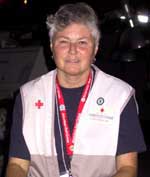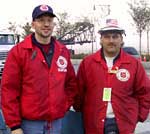Minnesota volunteers describe work at 'ground zero'
By Tom Scheck
Minnesota Public Radio
October 15, 2001
Firefighters, police officers and other emergency personnel in New York City are getting assistance from many Minnesotans who say it was their duty to travel to the World Trade Center site after September eleventh. A wide variety of Minnesotans, representing organizations like the Red Cross and Salvation Army, made the trip in the past month.
Red Cross volunteer Lucy Ferrell says she wanted to go to New York once she saw the devastation on television. Since she's an experienced nurse who teaches at the University of Minnesota, the American Red Cross was willing to send her to New York City once air travel resumed on September 15th.
"I lived here for four years, and I wanted to come back and be here for this," Ferrell says. "I kind of know the cities and the subways, so it's easier to plug me in."
Ferrell says she started treating burn patients at hospitals in Manhattan and Brooklyn almost immediately upon arrival. After completing her rounds on one brisk evening, Ferrell sat on a bench at the South Street Seaport, one of the city's ferry stations. Ferrell says she thought she was prepared for the disaster because she was a Navy nurse during the Vietnam War between 1966 and 1968. But she says the causalties and injuries to civilians struck her differently.
"These were people going to work, these were children at a daycare center. These were people waiting for a bus. These were people going to the bank, these were tourists," Ferrell says. "We weren't at war, they were not soldiers and that was part of the horror for me."
Ferrell says her most difficult time as a volunteer came when she visited the World Trade Center site with the family of one of her patients. She says seeing the wreckage with people who were directly impacted by the tragedy was incredibly draining. After the visit, she said she spent the rest of the afternoon in her hotel room crying.
While Ferrell and other volunteers only see the wreckage on an occasional basis, Salvation Army Capt. Monty Wandling and Social Service Director Terry Hildebrandt, both from the Twin Cities, spend their days providing food and comfort to the relief workers at "ground zero." The two are on the night shift, working from 7 p.m. to 7 a.m.
Wandling is a Salvation Army pastor and has been spending most of his time working directly with the emergency personnel. He was present when 50 firefighters found one of their comrades buried in the rubble. He says he watched as they pulled the man out and draped his body with an American flag. He says he spends a large part of his day trying to get the relief workers to share their feelings about the situation.
"It was a very moving experience. Just talking with firefighters, just trying to hear their stories and just trying to get them to talk a little bit about what's happening - because they've seen so much and have been through so much. And they're tired," says Wandling. "We're just trying to help in any way - whether it be emotionally or spiritually or physically - through snacks, drinks, hot meals. We're there to help them out."
Wandling says he and Hildebrandt can only offer a small amount of therapy to the emergency personnel. He says the city and state will need to find more grief counselors to assist the relief workers, the victims and their families for years. He says it's quite possible that many of the workers at "ground zero" won't even start coping with the events until the last brick is picked up.
Both Wandling and Hildebrandt say they'll also receive extensive counseling when they return to Minnesota in the next couple of weeks. Hildebrandt says many of the volunteers are concerned that their experiences may have a negative impact on their lives once they return.
"I've talked with a number of people who say they're nervous about going home because either their friend, husband or wife hasn't been through this," Hildebrandt says. "They kind of put their hands six inches apart and say, 'Are we going to be on a different plane? And how do we get on the same plane again?' - because of the impact they feel this will have on them. And I'm not quite sure how we'll pull that off yet."
All of the volunteers contacted for this story say they'll treasure the time they've spent in New York - not because they've seen the wreckage, but because they've seen the tremendous amount of support from people all over the world.
By Tom Scheck
Minnesota Public Radio
October 15, 2001
|
|
RealAudio |
| |
|
|
|
||
"I lived here for four years, and I wanted to come back and be here for this," Ferrell says. "I kind of know the cities and the subways, so it's easier to plug me in."
Ferrell says she started treating burn patients at hospitals in Manhattan and Brooklyn almost immediately upon arrival. After completing her rounds on one brisk evening, Ferrell sat on a bench at the South Street Seaport, one of the city's ferry stations. Ferrell says she thought she was prepared for the disaster because she was a Navy nurse during the Vietnam War between 1966 and 1968. But she says the causalties and injuries to civilians struck her differently.
"These were people going to work, these were children at a daycare center. These were people waiting for a bus. These were people going to the bank, these were tourists," Ferrell says. "We weren't at war, they were not soldiers and that was part of the horror for me."
Ferrell says her most difficult time as a volunteer came when she visited the World Trade Center site with the family of one of her patients. She says seeing the wreckage with people who were directly impacted by the tragedy was incredibly draining. After the visit, she said she spent the rest of the afternoon in her hotel room crying.
While Ferrell and other volunteers only see the wreckage on an occasional basis, Salvation Army Capt. Monty Wandling and Social Service Director Terry Hildebrandt, both from the Twin Cities, spend their days providing food and comfort to the relief workers at "ground zero." The two are on the night shift, working from 7 p.m. to 7 a.m.
| |
|
|
|
||
"It was a very moving experience. Just talking with firefighters, just trying to hear their stories and just trying to get them to talk a little bit about what's happening - because they've seen so much and have been through so much. And they're tired," says Wandling. "We're just trying to help in any way - whether it be emotionally or spiritually or physically - through snacks, drinks, hot meals. We're there to help them out."
Wandling says he and Hildebrandt can only offer a small amount of therapy to the emergency personnel. He says the city and state will need to find more grief counselors to assist the relief workers, the victims and their families for years. He says it's quite possible that many of the workers at "ground zero" won't even start coping with the events until the last brick is picked up.
Both Wandling and Hildebrandt say they'll also receive extensive counseling when they return to Minnesota in the next couple of weeks. Hildebrandt says many of the volunteers are concerned that their experiences may have a negative impact on their lives once they return.
"I've talked with a number of people who say they're nervous about going home because either their friend, husband or wife hasn't been through this," Hildebrandt says. "They kind of put their hands six inches apart and say, 'Are we going to be on a different plane? And how do we get on the same plane again?' - because of the impact they feel this will have on them. And I'm not quite sure how we'll pull that off yet."
All of the volunteers contacted for this story say they'll treasure the time they've spent in New York - not because they've seen the wreckage, but because they've seen the tremendous amount of support from people all over the world.


